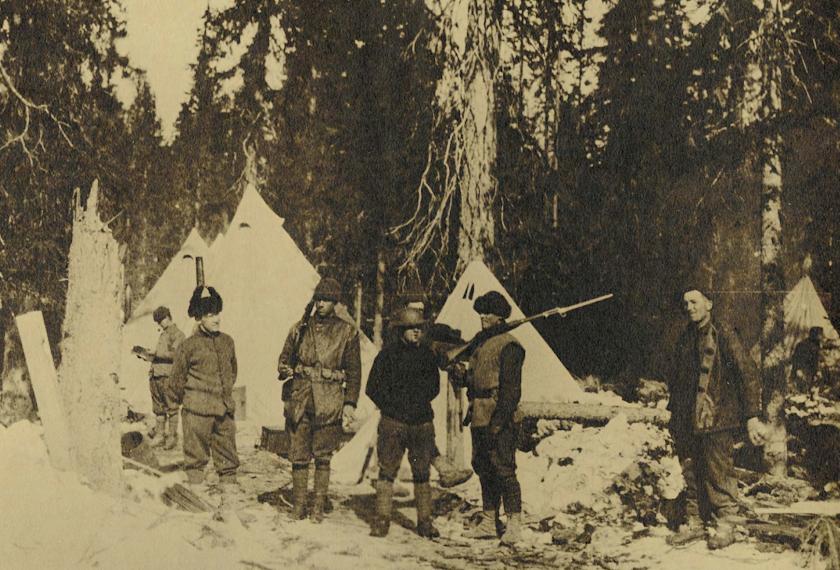At the end of World War I, American soldiers—mostly from Michigan—were deployed to join the Northern Russian Expeditionary Force for a vaguely defined mission. They found themselves embroiled in a civil war, battling Bolshevik revolutionaries for months after the Armistice ended fighting in France. A new play inspired by these men, known as the Polar Bears for enduring harsh winter conditions, will have its world premiere May 9-11 at Northern Michigan University. The idea for Ghost Soldiers by Keli Crawford-Truckey stemmed from a war-time journal bound by leather from the boot of a dead Bolshevik soldier. It was kept by the grandfather of NMU employees Dan and Paul Truckey.
According to an online exhibition by NMU's Beaumier U.P. Heritage Center, more than 100 men from the Upper Peninsula served in the Polar Bears. Almost all were first-generation Americans, some not even yet citizens, and they represented the great social and ethnic diversity of the U.P. during that era. The men endured hardships, deprivation and great loss.
“This is a really interesting regional story that most people don't know much about,” said Crawford-Truckey, who is also directing the show. “I did a lot of my own research and read a lot of soldiers' journals and diaries, then pulled excerpts from a bunch of their experiences and tried to find the most dramatic ones. The play focuses on six young men—not specific individuals, but a representation. It's hard to portray war scenes in a live performance on the smaller Panowski Black Box Theatre stage. Fighting is implied, but we focus on a lot of the soldiers' downtime and mix in brief vignettes of their lives in later years, from the 1930s to the 1970s.”
Crawford-Truckey said the story addresses the themes of self-identity, constructed in the reflections of family and the country's politics; self-worth, which is often influenced by parents; and relationships, particularly between fathers and sons. The play is also about what individuals express to the people they love, and what they internalize.
“I'm also very interested in the spirit in which most men engaged in war,” she said. “There was such a pride and virility to it; it basically defined one's manlihood. If you didn't fight in World War I or II, it was perceived that there was something lacking in your experience. Many found their identity in warfare. Yet these soldiers came back defeated because it was a debauched mission, no one really knew why they were there, and they didn't return war heroes as they had hoped.”
Dan Truckey, director of the Beaumier U.P. Heritage Center, possesses the war-time journal of his maternal grandfather, Dalton Gollinger of Munising.
“It is very matter of fact; there's very little emotional content,” Truckey said. “But it inspired me to study the Polar Expedition when I became a history student at Northern because I didn't understand it very well. I've researched it for many years and created exhibits about it. One thing that came out of it for me was a better understanding of what my grandfather went through being involed in major battles of the conflict, and how that impacted him. His relationships with my grandmother and mom were strained at times because of it. I only knew him as an old man beaten down by life's struggles and his addiction to alcohol. I was 15 when he died, but wished I had sat down to talk with him about this because he didn't share much at all.”
Truckey said the American soldiers joined an international force in Russia commanded by the British. The treatment they received, compared with their British counterparts, led to strong resentment that lingered for the rest of his grandfather's life.
According to the Bentley Historical Library at the University of Michigan, a winter of fighting Bolsheviks and wondering why they were still in combat when the war with Germany had ended led to severe morale problems among the American troops. This resulted in an alleged mutiny in March 1919 by members of one company in Archangel, and the presentation of an antiwar petition by members of another company in the same month.
“The troops were ready for the new American commander who arrived at Archangel in April 1919 with orders to withdraw,” the summary stated. “As soon as navigation opened in June, the American forces left northern Russia. British troops withdrew a few months later, but the anti-Bolshevik government they left behind held the city until February 1920.”
In 1922, veterans of the campaign held their first reunion in Detroit and formed the Polar Bear Association to preserve their comradeship and perpetuate the memory of their expedition. The organization was active at least until 1983, when 22 surviving members of the association held a luncheon meeting in Detroit.
Truckey said there was no Veterans Administration to help returning soldiers address post-traumatic stress disorder and other issues. His grandfather was a charter member of Munising's American Legion, which offered an outlet for socializing with others who shared similar experiences following their service.
Tickets for Ghost Soldiers, the 2024 Panowski Playwriting Award winner, are available at nmu.universitytickets.com. The cost is $20 for the general public, $15 for NMU faculty/staff, military and seniors; $13 for students 18 and under; and $5 for NMU students with an ID. Find more information about the play here. View the Beaumier U.P. Heritage Center's online exhibition on the Polar Bears here.

